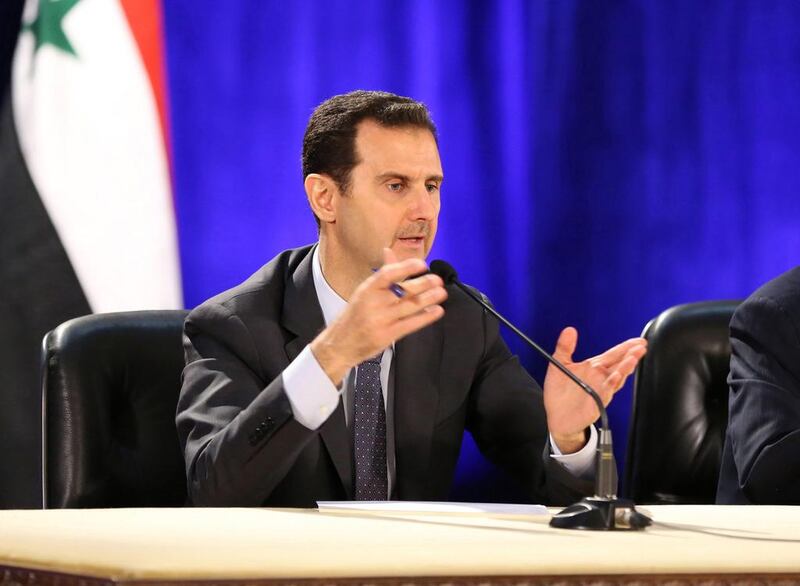Bouthaina Shaaban, the adviser to President Bashar Assad, was angered by programmes broadcast recently on some friendly television channels, including Al Mayadeen and Al Manar, which suggested that the Syrian regime would not have survived this long if it were not for Iran and Hizbollah, observed Yasser Al Zaatra, in the Jordanian newspaper Addustour.
“This is unacceptable. Syria has resisted with its people who have so far given more than a quarter of a million martyrs,” retorted Ms Bouthaina.
When her remarks attracted media attention, Ms Bouthaina denied her statement, saying: “Hizbollah and Lebanon are in the camp of the resistance, and what has been attributed to me on Facebook cannot come from any Syrian citizen.”
In fact, the denial is more interesting than the statement.
The latter makes sense from a political perspective in that it backs the claims of the Syrian regime’s media that Mr Al Assad is winning over terrorism, “thanks to the Syrian people rallying around him”.
Shortly after Mr Al Assad’s adviser dismissed the statement, Iran’s Revolutionary Guard air force chief said: “The Assad regime did not fall because Iran did not want that.” This announcement not only confirmed that the Syrian regime has survived because of Iran’s total support, but also that Hizbollah’s intervention was ordered by Iran.
Let's face it – what is happening today in Syria is a war between the Syrian people, and Iran and its agents. The Syrian army's role has become marginal to a large extent. The regime's troops have lost thousands of their men in the battle and can no longer afford to lose more.
This is why, the writer continued, the army mostly provides air and artillery cover and leaves the efforts to regain rebel-held areas to Hizbollah troops and Iranian-trained fighters coming from outside. Syria, as it stands, is practically occupied by Iran and its agents.
In the same vein, Abdulrahman Al Rashid argued in the London-based daily Asharq Al Awsat that had Iran not taken a strategic decision to rescue the Assad regime, it would not have made it to the year 2013.
This explains the ecstasy and bragging of Iranian military leaders, namely the air force chief who boasted that it was Iran that saved the Assad regime. This is also what prompted the Hizbollah leader Hassan Nasrallah to say during an interview with the Lebanese newspaper Al Safir that the mistake was not intervening in Syria, the mistake was rather intervening late.
Albeit true, the statements from allies were an insult and an embarrassment to Mr Al Assad and his troops. Hence Ms Shaaban’s statement that the credit for the victory goes to Mr Al Assad’s army, not to Iran or Hizbollah. The Syrian regime has reportedly imposed restrictions on Iran-affiliated television personnel to ensure they did not attribute victories to Iran and its proxies. Some reports even suggested that the Syrian regime planned the killing of journalists from Hizbollah’s Al Manar broadcaster, who were covering the events in Maaloula without the government’s permission.
The question, though, is not about who should be given the credit for the victory, but whether the Assad regime has really won. The Syrian president claims it has, and so does Mr Nasrallah and the Iranian official, although the latter added it was Iran's decision.
The US State Department has issued a fuzzy statement that it did not agree with what Mr Al Assad said and that it did not want to predict how the war was going to end.
Despite celebrations of victories in Damascus, Tehran, Moscow and Hizbollah’s strongholds in Lebanon, the Assad regime must know that such victories are temporary and that the end will be different because the facts on the ground are more important than short-lived outcomes of battles.
First, Mr Al Assad’s forces and allies’ militias control only one-third of Syria. If they continue the war across the rest of the country, they would be further exhausted. And even pro-Assad foreign militias will not be able to withstand the long-running war of attrition.
Second, the facts on the ground have changed and the regime-people relationship has been shattered. The Syrian army that is under the president’s command has greatly shrunk in numbers as a result of defections and losses during the three-year conflict.
Moreover, President Al Assad, his forces and allies represent a small sectarian minority in control of a large majority, about 70 per cent of Sunnis. Syrians now no longer buy the Baathist propaganda that it is a nonsectarian government. This fight will last until the regime falls, despite support from Iran and its militias, the writer concluded.
aezzouitni@thenational.ae





